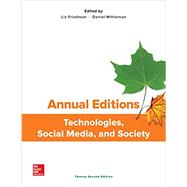
Annual Editions: Technologies, Social Media, and Society
- ISBN13: 9781259873430
- ISBN10: 1259873439
- Additional ISBN(s): 9781259349812, 9781260180282
- Edition: 22nd
- Format: Paperback
- Copyright: 2017-01-13
- Publisher: McGraw-Hill Education
- View Upgraded Edition
-
Your order must be $35 or more to qualify for free economy shipping. Bulk sales, PO's, Marketplace items, eBooks and apparel do not qualify for this offer.








